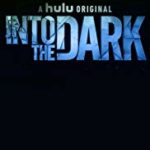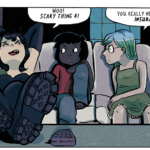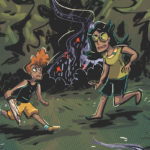 INTO THE DARK – SEASON 2
INTO THE DARK – SEASON 2
EP1: Uncanny Annie & EP2: Pilgrim
Starring:
Episode 1: Adelaide Kane, Georgie Flores, Paige McGhee, Jacques Colimon, Dylan Arnold, Evan Bittencourt,
Karlisha Hurley
Episode 2: Reign Edwards, Kerr Smith, Courtney Henggeler, Peter Giles, Beth Curry, Antonio Raul Corbo, Taj Speights, Elyse Levesque
Director:
Episode 1: Paul Davis
Episode 2: Marcus Dunstan
Writer:
Episode 1: Alan Blake Bachelor, James Bachelor
Episode 2: Noah Feinberg, Marcus Dunstan, Patrick Melton
Production Company: Blumhouse Television
Distribution: Hulu
“A game can’t kill people … It just fucking did!” – Uncanny Annie
“Did we just murder? As a family?” – Pilgrim
The first season of Into the Dark (2018-2019) offered a mixed bag of movies. From the onset, it was an interesting concept where, each month, there would be a new installment. Each one of these would be based on the main holiday of that month, including Halloween, Christmas, New Year’s Eve, among others. However, the results were inconsistent. The anthology struggled in releasing quality horror movies, and when it finally did, it couldn’t maintain it. Viewers appeared to think so as well, if the reviews and ratings on both Rotten Tomatoes and IMDb are anything to go by. So what went wrong?
I was impressed at the originality of some of the stories and found them intriguing. It was one of the main reasons I kept coming back to watch each new monthly entry. But more often than not, the movie didn’t deliver on its promise. Something between the concept and final product didn’t work, for a number of reasons. Perhaps my disappointment stemmed from the fact that the show was backed by Blumhouse, a true horror production company. The idea of holiday-themed horror produced by Blumhouse was exciting, and my expectations were high. To be clear, the first season wasn’t terrible by any means. That a second season was ordered clearly shows Hulu believed in this show, a decision that would have to have been based partly on viewership as well. With all this said, I wondered if the mistakes, or rather, weaknesses of the first season, would be addressed.

The first episode of Season Two was for Halloween. The premise, as usual, was interesting, even if not completely original. In Uncanny Annie, a horror takes on the Jumanji idea; several friends decide to play games on Halloween night. A quick trip to the basement unearths several games, including one called Uncanny Annie. It’s a simple concept, requiring that players pick a card and complete the indicated task. Successful completion brings them one step closer to winning the game. Unbeknownst to the players, though, is that the tasks take on a real-life vibe, à la Jumanji, and ultimately threaten their lives.
Movies where games have real-life consequences aren’t new. How many of them have used the Ouija game? Would You Rather (2012) was an excellent movie. More recently, there’s been Truth or Dare, both the Syfy (2017) and theatrical (2018) versions. All these have taken on the game-turns-into-real-life story quite successfully. Even outside the horror genre, there are successful adaptations, like Jumanji (1995, 2017) and Zathura: A Space Adventure (2005). Given these comparison points, the success of Uncanny Annie would, in part, be based on whether it was on par or even better than similar movies. Unfortunately, it wasn’t better and barely on par.

From the start, many situations make little sense, are questionable, and just feel contrived. For example, when Eve (Georgie Flores) is told to go in the basement to get the games and returns with Uncanny Annie, nobody knows where it came from. Wouldn’t Peter (Evan Bittencourt) have seen it when he first brought the games down in the basement? It’s not as if the game was set aside elsewhere and Eve grabbed it. It was in the same pile as the others. And as they curiously look at the box, wondering whether they should play it, nobody thinks actually to open it to see what’s inside. It feels unnatural. And the questions only pile on from there.
Why does Grace (Paige McGhee) carry around a drill thinking it would help her deal with supernatural entities? How did Wendy (Adelaide Kane) and Grace think The Prankster (Camden Toy) would be lured and contained in the kitchen? Why does some of the dialogue feel as though it’s there for background exposition for the sake of the audience? After everything he’s witnessed throughout the game, why does Michael (Dylan Arnold) still choose to lie? So many head-scratching moments. But for an episode filled with questionable actions, I was surprised that the writers dealt with one often overlooked issue.

How many times do horror movies have people in a house, a camp, or some small area and never have them look for an opportunity to escape? Sydney Prescott (Neve Campbell) famously stated that she hated horror movies because they’re always about “some big-breasted girl who can’t act who is always running up the stairs when she should be running out the front door. It’s insulting.” In Uncanny Annie, this is addressed and explained! Finally! And it makes sense. Unfortunately, those moments are few and far between.
(Spoiler alert. If you have not seen the episode, skip to the next paragraph.) I wasn’t fond of the ending. What was the point of going through the movie if that was the end result? Is the game some excuse for Annie (Karlisha Hurley) to quasi-sadistically toy with her prey? If so, why hide the premise inside a game story?
On the other hand, if the game is an integral part of the story, then why come to that particular ending? There could have been better ways to resolve the story while still maintaining the integrity of the Uncanny Annie idea. Some watchers may find themselves cheated, for lack of a better word.
The cast does perform well, given the situations they’re given. The setting (inside a large house) was well chosen, giving the characters plenty of room to explore and hide in. Karlisha Hurley plays the role of Annie quite well. With the help with some CGI, Annie looks scary. She has Kayako (The Grudge, 2004) and Samara (The Ring, 2002) overtones, with an evil, almost child-like laughter.
In contrast, her sweet, cheery voice makes it creepy. It’s disturbing. The other malevolent presences (The Prankster and Dave Reaves’s Black Boots) were well played. However, they’re just not memorable. For a movie titled Uncanny Annie, it would have been beneficial to have Annie more present.
 For its second entry of the season, Into the Dark gave us the Thanksgiving-themed Pilgrim. It tells the story of a family who decides to do something different. Anna (Courtney Henggeler) invites what she believes to be actors playing the roles of pilgrims for their Thanksgiving celebrations. They arrive in costume, along with the appropriate behaviors and stories to tell, and quickly settle in. But this is a horror anthology, and as one would expect, what Anna had hoped for is far from the nightmare that actually takes place.
For its second entry of the season, Into the Dark gave us the Thanksgiving-themed Pilgrim. It tells the story of a family who decides to do something different. Anna (Courtney Henggeler) invites what she believes to be actors playing the roles of pilgrims for their Thanksgiving celebrations. They arrive in costume, along with the appropriate behaviors and stories to tell, and quickly settle in. But this is a horror anthology, and as one would expect, what Anna had hoped for is far from the nightmare that actually takes place.
Coinciding with Anna’s invitation of these actors is Cody’s (Reign Edwards) wish. Her and her brother Tate (Antonio Raul Corbo) break the wishbone during which Cody wishes that Anna’s plan backfires. Of course, she gets the longer side, thereby granting her wish and, well, boy oh boy do Anna’s plans ever backfire. Cody is about to be taught a lesson about gratitude and her selfish attitude about her life. As with most of the other entries in this anthology, the idea was good and intriguing. Unfortunately, there were again a few issues with the delivery.
Horror movies require significant suspension of disbelief in order to work. Let’s be honest, does anyone really believe that Jason Voorhees or Michael Myers can be killed and come back to life movie after movie? Or that a talking doll can go on a killing rampage? Given the genre, viewers are more forgiving, willing to accept a lot, and give stories some leeway. However, Pilgrim begins with an incredibly difficult premise to accept. In hiring Ethan (Peter Giles) and Patience (Elyse Levesque), Anna agrees that they stay at the house for an indeterminate time. Oh, and for good measure, once settled in, Ethan begins to invite more “pilgrims” to move into the house. Really? We’re supposed to believe that this would actually happen? That it makes sense?

Once over that initial crazy premise, the episode works better. The reason for Ethan’s presence slowly develops but in a creepy way. Though his motivations aren’t fully fleshed out at the beginning, his underlying madness and intensity quickly reveal themselves. It’s worth the watch. However, as the movie progresses, be warned that the actions grow in absurdity. And why wouldn’t they? Recall that this movie begins with an absurd premise. To take this episode serious is a mistake.
As Cody’s warnings about Ethan go unheeded, the violence inflicted on her and her family increases. Patience is particularly nasty in her treatment of Katherine (Beth Curry) (you’ll never look at traditional butter churning the same way again). Her blind and loyal devotion to Ethan is admirable and frightening. Whereas Ethan has a certain charisma and charm to lull his “victims” into a sense that all is well, Patience is cold, unsmiling, and ruthless. The two make a frightening combination.
Pilgrim suffers from two issues. The first is the lesson that is being “taught.” Thanksgiving is about, well, giving thanks. It’s in the name. It’s a time for showing gratitude for all the things in one’s life. In this movie, the family suffers Ethan’s torture to make them realize how ungrateful they’ve been. It’s a great horror take on the holiday and really had potential. But Ethan brings it up too often and isn’t subtle about it. The pool scene with Cody dragged on too long. And just as it looked like Ethan was done, he begins the whole “are you grateful” rhetoric at the dinner table again. Its incessant repetition is annoying. There’s making a point, but then there’s overkill.

The second issue is about the nature of the pilgrims. The storyline was put into motion when Cody and her brother make the wish by breaking the wishbone, hence Ethan’s appearance. His subsequent reference to the wish indicates some supernatural element; otherwise, how would he have known? Furthermore, how they refer to their backstory again reeks of the supernatural. However, as the story plays out, it appears as though they are mortal. In fact, the end is perplexing as it provides an argument for both. While this may work in some stories, it didn’t with this set-up and backstory.

One more issue. Into the Dark is advertised as a horror anthology. Granted, the horror genre can take on many sub-genre, but one thing seems to be missing: the scare factor. Uncanny Annie tried, cheaply, to have the audience jump with The Prankster and Annie herself. No such scare attempts occur in Pilgrim. Why not? Where have the good old classic horror scares, the ones that truly scare, gone?
Though it includes horror elements, Pilgrim feels like a lesson about gratitude. Cody and her family are punished for not appreciating what they have, like a parent scolding a child. Similarly, Uncanny Annie is horror, but there’s a heavy moral component about the secrets one keeps and how karma is bound to come around. For many, this works. I enjoy those types of horror movies as well. But to always have moral-carrying, lesson-to-learn, and thinking horror gets tiresome. It would be fun to have a few entries in Into the Dark be those terrifying, jump-out-of-your-seat, and sleep-with-the-lights-on horror. Given the range of horror sub-genres, it certainly wouldn’t hurt the anthology.
Two episodes into the second season, and it appears to be the same story as in the first season. The stories elicit an interest based on their descriptions, but slightly disappoint to a various extent because of their unmet potential. The application of the ideas needs to improve. Having said this, they aren’t bad to watch. They have good entertainment value. The acting is good, and you’ll find yourself watching the entire movie to see its resolution, as they do hook you in. You’ll see drama, horror, romance, and even comedy, and the special effects are well done, never looking cheap or of B-movie quality. Temper your expectations, and you’ll enjoy.




